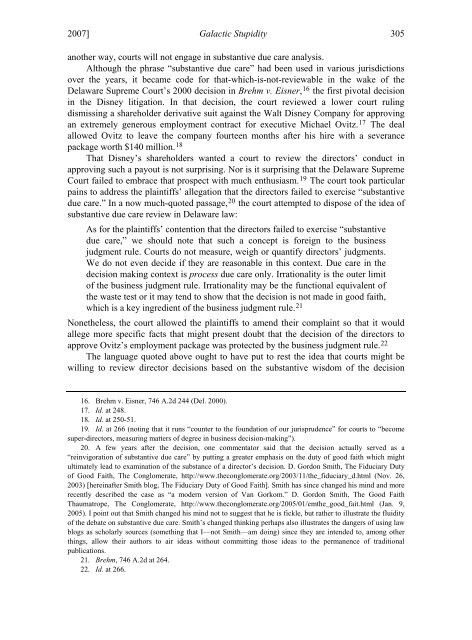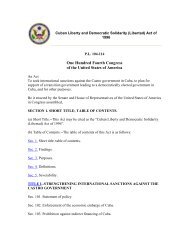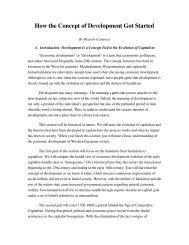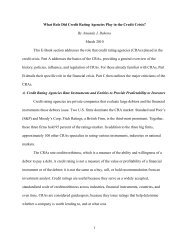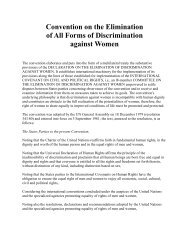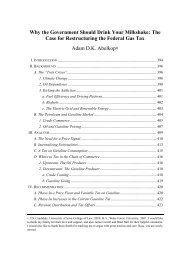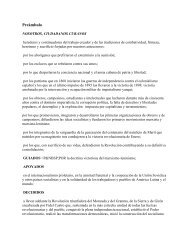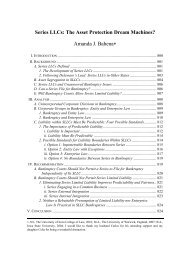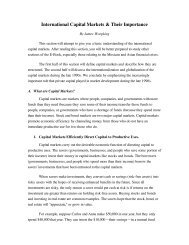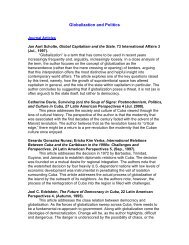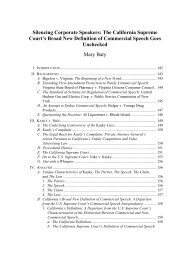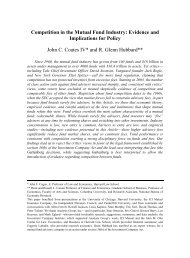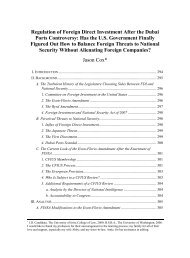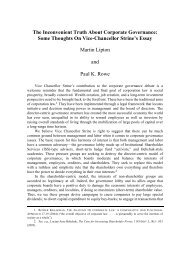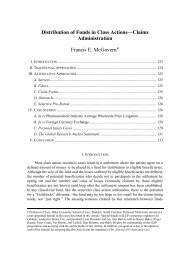Galactic Stupidity and the Business Judgment Rule - College of Law
Galactic Stupidity and the Business Judgment Rule - College of Law
Galactic Stupidity and the Business Judgment Rule - College of Law
You also want an ePaper? Increase the reach of your titles
YUMPU automatically turns print PDFs into web optimized ePapers that Google loves.
2007] <strong>Galactic</strong> <strong>Stupidity</strong> 305<br />
ano<strong>the</strong>r way, courts will not engage in substantive due care analysis.<br />
Although <strong>the</strong> phrase “substantive due care” had been used in various jurisdictions<br />
over <strong>the</strong> years, it became code for that-which-is-not-reviewable in <strong>the</strong> wake <strong>of</strong> <strong>the</strong><br />
Delaware Supreme Court’s 2000 decision in Brehm v. Eisner, 16 <strong>the</strong> first pivotal decision<br />
in <strong>the</strong> Disney litigation. In that decision, <strong>the</strong> court reviewed a lower court ruling<br />
dismissing a shareholder derivative suit against <strong>the</strong> Walt Disney Company for approving<br />
an extremely generous employment contract for executive Michael Ovitz. 17 The deal<br />
allowed Ovitz to leave <strong>the</strong> company fourteen months after his hire with a severance<br />
package worth $140 million. 18<br />
That Disney’s shareholders wanted a court to review <strong>the</strong> directors’ conduct in<br />
approving such a payout is not surprising. Nor is it surprising that <strong>the</strong> Delaware Supreme<br />
Court failed to embrace that prospect with much enthusiasm. 19 The court took particular<br />
pains to address <strong>the</strong> plaintiffs’ allegation that <strong>the</strong> directors failed to exercise “substantive<br />
due care.” In a now much-quoted passage, 20 <strong>the</strong> court attempted to dispose <strong>of</strong> <strong>the</strong> idea <strong>of</strong><br />
substantive due care review in Delaware law:<br />
As for <strong>the</strong> plaintiffs’ contention that <strong>the</strong> directors failed to exercise “substantive<br />
due care,” we should note that such a concept is foreign to <strong>the</strong> business<br />
judgment rule. Courts do not measure, weigh or quantify directors’ judgments.<br />
We do not even decide if <strong>the</strong>y are reasonable in this context. Due care in <strong>the</strong><br />
decision making context is process due care only. Irrationality is <strong>the</strong> outer limit<br />
<strong>of</strong> <strong>the</strong> business judgment rule. Irrationality may be <strong>the</strong> functional equivalent <strong>of</strong><br />
<strong>the</strong> waste test or it may tend to show that <strong>the</strong> decision is not made in good faith,<br />
which is a key ingredient <strong>of</strong> <strong>the</strong> business judgment rule. 21<br />
None<strong>the</strong>less, <strong>the</strong> court allowed <strong>the</strong> plaintiffs to amend <strong>the</strong>ir complaint so that it would<br />
allege more specific facts that might present doubt that <strong>the</strong> decision <strong>of</strong> <strong>the</strong> directors to<br />
approve Ovitz’s employment package was protected by <strong>the</strong> business judgment rule. 22<br />
The language quoted above ought to have put to rest <strong>the</strong> idea that courts might be<br />
willing to review director decisions based on <strong>the</strong> substantive wisdom <strong>of</strong> <strong>the</strong> decision<br />
16. Brehm v. Eisner, 746 A.2d 244 (Del. 2000).<br />
17. Id. at 248.<br />
18. Id. at 250-51.<br />
19. Id. at 266 (noting that it runs “counter to <strong>the</strong> foundation <strong>of</strong> our jurisprudence” for courts to “become<br />
super-directors, measuring matters <strong>of</strong> degree in business decision-making”).<br />
20. A few years after <strong>the</strong> decision, one commentator said that <strong>the</strong> decision actually served as a<br />
“reinvigoration <strong>of</strong> substantive due care” by putting a greater emphasis on <strong>the</strong> duty <strong>of</strong> good faith which might<br />
ultimately lead to examination <strong>of</strong> <strong>the</strong> substance <strong>of</strong> a director’s decision. D. Gordon Smith, The Fiduciary Duty<br />
<strong>of</strong> Good Faith, The Conglomerate, http://www.<strong>the</strong>conglomerate.org/2003/11/<strong>the</strong>_fiduciary_d.html (Nov. 26,<br />
2003) [hereinafter Smith blog, The Fiduciary Duty <strong>of</strong> Good Faith]. Smith has since changed his mind <strong>and</strong> more<br />
recently described <strong>the</strong> case as “a modern version <strong>of</strong> Van Gorkom.” D. Gordon Smith, The Good Faith<br />
Thaumatrope, The Conglomerate, http://www.<strong>the</strong>conglomerate.org/2005/01/em<strong>the</strong>_good_fait.html (Jan. 9,<br />
2005). I point out that Smith changed his mind not to suggest that he is fickle, but ra<strong>the</strong>r to illustrate <strong>the</strong> fluidity<br />
<strong>of</strong> <strong>the</strong> debate on substantive due care. Smith’s changed thinking perhaps also illustrates <strong>the</strong> dangers <strong>of</strong> using law<br />
blogs as scholarly sources (something that I—not Smith—am doing) since <strong>the</strong>y are intended to, among o<strong>the</strong>r<br />
things, allow <strong>the</strong>ir authors to air ideas without committing those ideas to <strong>the</strong> permanence <strong>of</strong> traditional<br />
publications.<br />
21. Brehm, 746 A.2d at 264.<br />
22. Id. at 266.


